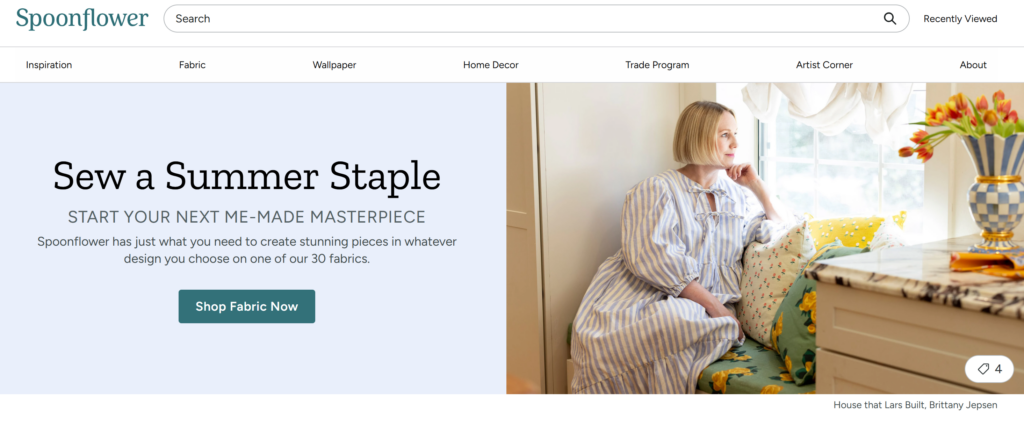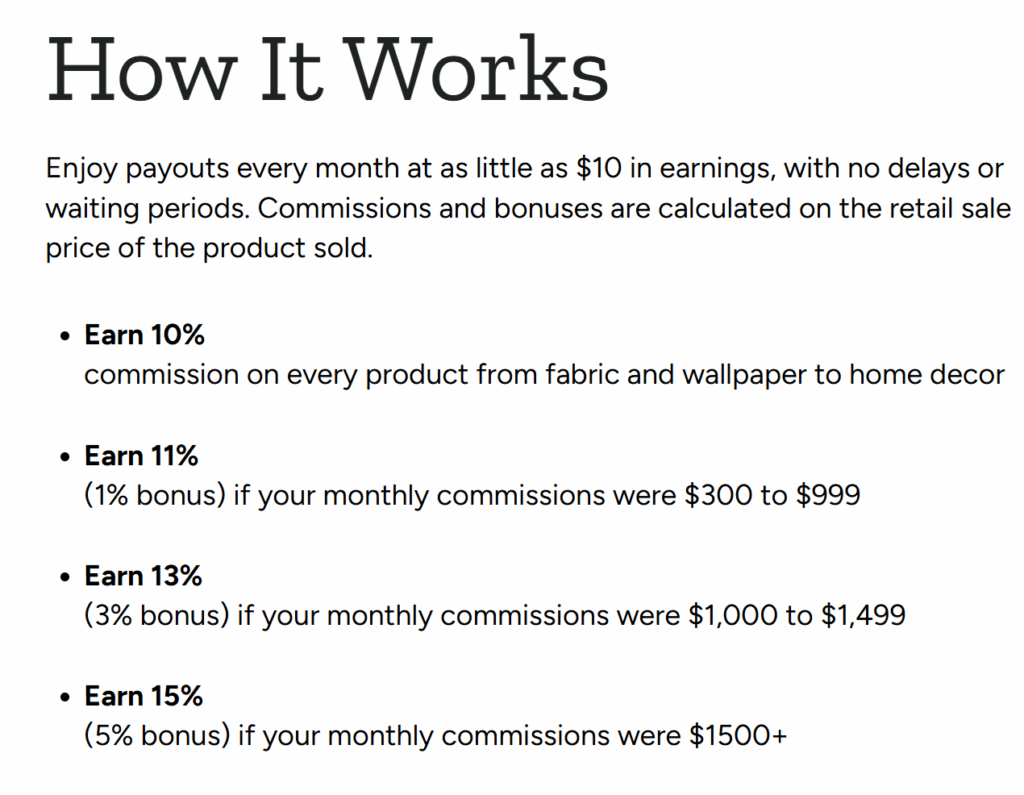Spoonflower is a print-on-demand platform that specializes in custom fabric, wallpaper, and home decor products. Founded in 2008, the company has grown to become a leading marketplace for independent designers and a hub for creative enthusiasts.
Spoonflower allows users to design, print, and sell custom fabric, wallpaper, and home decor items. The platform operates on a direct-to-consumer (DTC) and business-to-business (B2B) model, focusing on custom, on-demand textile printing.

Key Features
- Custom Printing Services: Users can upload their own designs, which are then printed on various materials.
- On-Demand Production: Items are produced only when ordered, eliminating the need for large inventories.
- Wide Product Range: Offers fabrics, wallpaper, gift wrap, and finished goods like pillows, curtains, and bedding.
- Marketplace for Designers: Independent artists can sell their designs and earn royalties.
- Digital Platform: User-friendly interface for design uploads, order management, and customer service.
- Manufacturing Facilities: Located in Durham, North Carolina (USA) and Berlin, Germany.
- Sustainable Practices: Uses water-based inks and responsibly sourced materials.
Benefits
- No Minimum Orders: Customers can order as little or as much as they need.
- Artist Support: Independent designers earn a 10% royalty on each sale.
- Customization: Allows for personalized designs on a variety of products.
- Quality Materials: Offers over 30 different fabric types to choose from.
- Quick Turnaround: Short lead times to accommodate production schedules.
- Eco-Friendly: Print-on-demand model reduces waste and uses environmentally friendly inks.
- Community: Fosters a vibrant network of artists, makers, and DIY enthusiasts.
Additional Information
- Spoonflower expanded its offerings in 2015 by launching Roostery, a home decor brand using Spoonflower fabrics.
- The company uses digital printing technology, offering advantages over traditional textile printing methods.
- Spoonflower’s Pro Membership provides exclusive discounts and free standard shipping.
- As of 2024, Spoonflower has eliminated the need for designers to order physical proofs before selling their designs.
- The platform now implements weekly listing limits, allowing a maximum of 25 made-for-sale designs per artist per week.
Spoonflower’s innovative approach to textile printing and its focus on supporting independent designers have positioned it as a unique player in the print-on-demand industry. If you want to explore for more on selling other digital art click :- Teefury
How does Spoonflower ensure the quality of the designs printed on their products

Spoonflower ensures the quality of designs printed on their products through several measures:
- Quality Assurance Procedures: Every order goes through automated and manual quality assurance checks before shipping.
- Color Management System: Spoonflower uses a strong color management system to limit color variation from order to order.
- Eco-Friendly Printing Process: They employ direct-to-fabric printing for natural fabrics and dye-sublimation for polyester fabrics, using water-based inks and dyes that produce high-quality results.
- Inspection Process: The company has both automated and manual inspection procedures to ensure quality before shipping orders.
- Physical Proofs: Spoonflower recommends ordering physical proofs, as colors can look different when printed compared to on-screen. This allows designers to adjust their artwork if needed.
- High-Quality Materials: The company uses top-notch materials to produce their fabrics and wallpapers, ensuring durability and high quality.
- Printing Technology: Spoonflower uses state-of-the-art printing techniques, including pigment printing, which allows for detailed designs.
- Design Layout Tools: The platform provides design layout tools to help ensure designs print exactly as intended.
How does Spoonflower support independent designers on their platform.

Spoonflower supports independent designers on their platform in several ways:
- Marketplace for Designs: Spoonflower provides a platform where independent artists can upload and sell their custom fabric, wallpaper, and home decor designs.
- Royalties: Artists earn a 10% royalty on each sale of their designs, including home décor items.
- Design Challenges: The platform runs weekly design contests to encourage artists to create and upload new designs.
- Community Building: Spoonflower fosters a vibrant community of creators, allowing artists to connect with like-minded individuals and potential clients.
- Portfolio Development: The platform enables artists to build their portfolios by offering a wide range of products for their designs.
- Exposure to Industry Professionals: Design companies often visit Spoonflower, providing potential opportunities for artists.
- Sustainable Practices: Spoonflower’s print-on-demand model supports sustainable production, aligning with many artists’ values.
- Ownership Rights: Spoonflower respects artists’ rights and does not claim ownership of their artwork.
- Low Entry Barrier: Artists can showcase their designs without the costs associated with traditional manufacturing.
What changes has Spoonflower implemented to support artists
Spoonflower has recently implemented several changes to enhance support for artists on their platform. The company has introduced a free digital proofing tool, eliminating the need for artists to purchase physical proofs before selling their designs. To encourage more thoughtful and quality submissions, a new limit of 25 design uploads per week has been established. In an effort to reduce marketplace clutter, designs that are at least two years old, haven’t sold in two years, and have fewer than 50 favorites will be delisted. Design challenges are now held bi-weekly instead of weekly, giving artists more time to create and participate. Expanding earning potential, artists now receive 10% royalties on home décor items featuring their designs. These changes, along with marketplace optimization efforts, aim to create a less overwhelming shopping experience for consumers while improving discoverability for artists. Overall, these updates reflect Spoonflower’s commitment to focusing on quality over quantity, supporting artist earnings, and creating a more manageable marketplace for both creators and customers.
Spoonflower partner or Affilated Program
The Spoonflower affiliate program is a Cost-Per-Sale (CPS) model, where affiliates earn a percentage of every sale made through their unique referral links. It is designed for bloggers, influencers, and content creators who want to monetize their platforms by promoting Spoonflower’s products.

Key Features
- Commission Rate:
- Affiliates earn a 5% commission on all sales generated through their referral links.
- There is no minimum payout threshold, so affiliates can withdraw earnings regardless of the amount.
- Cookie Duration:
- The program offers a 60-day cookie window, meaning affiliates receive credit for purchases made within 60 days of a customer clicking their referral link.
- Affiliate Tools:
- Affiliates have access to banners, text links, and other promotional materials to integrate into their websites, blogs, or social media platforms.
- The program supports seamless integration with blogs, social media posts, and websites.
- Payout Methods:
- Payments are made via PayPal or other available methods through the CJ Affiliate platform.




